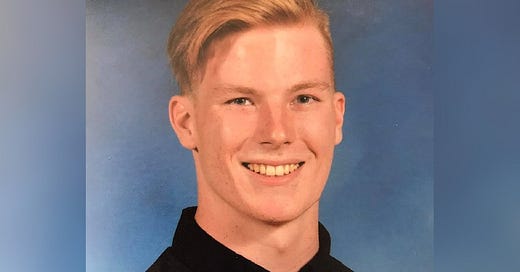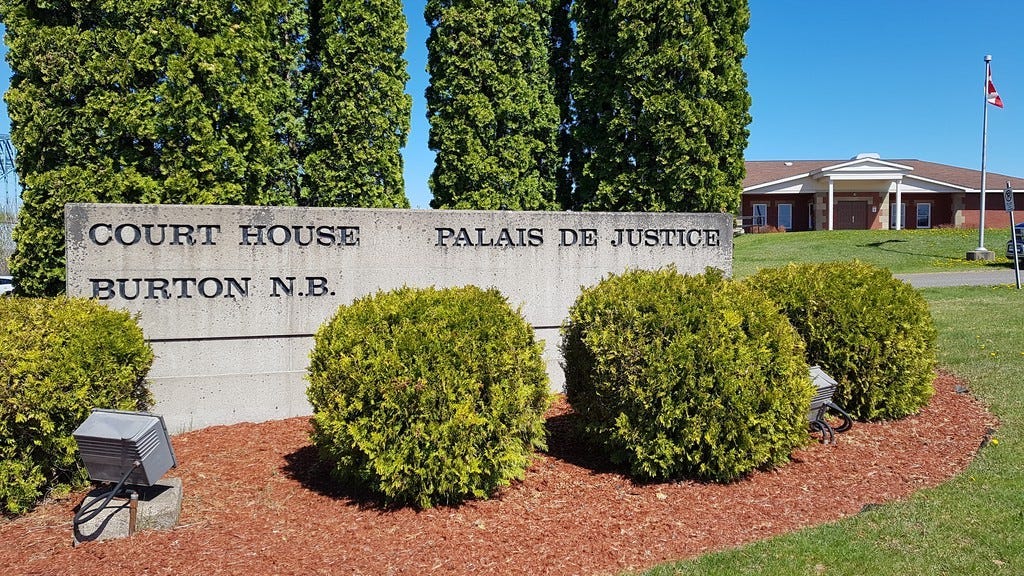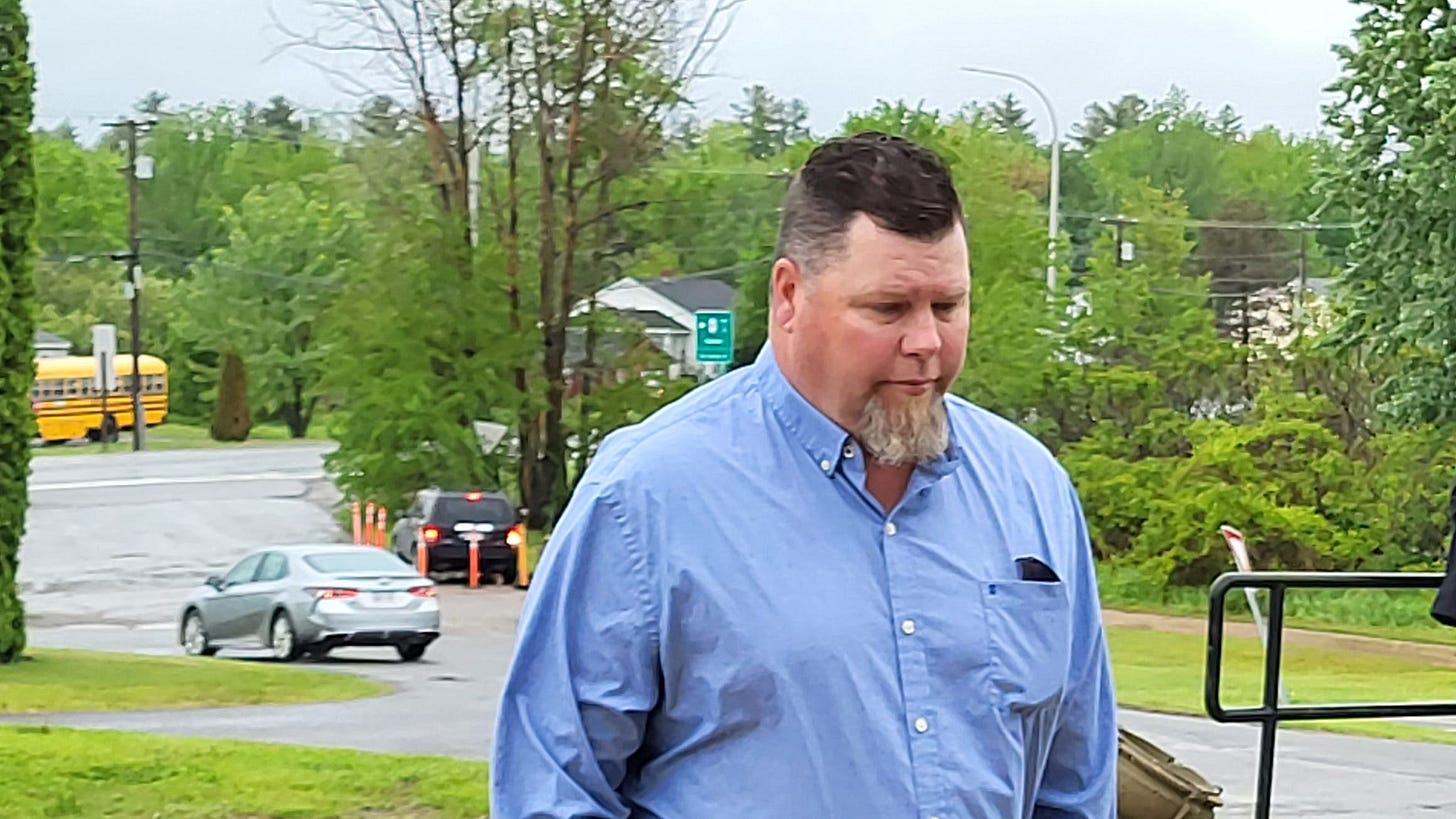‘This journey has been a living hell for all of us’
Family’s victim-impact statements read aloud at sentencing hearing for Jason Andrew King, 44, of Central Hainesville, for causing Michael Anthony Henderson's 2018 death
A teenager’s death at a construction site five years ago could cost the site foreman his freedom, but the victim’s family spoke Monday of the far greater cost to them.
Jason Andrew King, 44, of Crabbe Mountain Rd in Central Hainesville, was back in the Court of King’s Bench at the Burton Courthouse on Monday for his sentencing hearing.
Justice Thomas Christie found him guilty after trial earlier this year of criminal negligence causing the death of Michael Anthony Henderson on Aug. 16, 2018.
After hearing submissions Monday, the judge reserved his decision on sentence to Tuesday afternoon.
Henderson, 18, died Aug. 16, 2018, in an accident at a construction project at the City of Fredericton’s Barker Street Wastewater Treatment Plant.
He was working to clear debris at the bottom of an eight-foot hole when a large pneumatic plug holding back water flow from the hole gave way, pinning the young man and drowning him.
Springhill Construction Ltd. was handling the construction project, and King was Henderson’s supervisor on site at the time and was responsible for site safety.
Christie, in rendering his decision on trial in June, noted King knew Henderson was going to be in the hole and had arranged for water to flow ahead of a planned leak test.
As the site supervisor, King - whose employment with Springhill ended after the fatal accident - was responsible for site safety.
However, the judge noted King’s own evidence showed he’d read none of the site safety manuals.
“He testified he is not a reader,” Christie said.
King also testified Springhill had offered him no safety training.
The judge found the meagre safety precautions King put in place fell far short of any kind of reasonable plan.
An unimaginable sorrow
The court received 13 victim-impact statements from Michael Henderson’s family and friends, most of which were read aloud Monday.
The most dramatic and powerful of those statements came from the victim’s mother, Diane Henderson, and his older brother, Eric Henderson, both of which Diane Henderson read aloud in the main courtroom at the Burton Courthouse.
Diane Henderson said she was in Ontario with her partner visiting her mother when she got the call from Eric about what was happening. That call was followed by a second one a short time later from the hospital, with Eric “telling me Michael didn’t make it.”
After a desperate and tortured flight home to Fredericton, she said, she had to endure a new horror: being unable to touch her baby boy to say good-bye.
Because Michael’s body was slated to undergo an autopsy, she could only view him through a window at the hospital on a table, with tubes coming out of him. She couldn’t hold his hand, she said, or kiss his head.
Michael’s death shattered the bedrock of the family, many of the victims reported.
Grandparents, aunts, uncles, cousins and even the victim’s best friend from childhood all conveyed how losing him has changed their lives forever and cast a pall over the family that never seems to lift.
As indicated in testimony at trial, Eric was working on the same jobsite as Michael when the latter brother drowned and died, and it was him who jumped into the hole in a desperate bid to save Michael.
Eric wasn’t present for Monday’s proceedings, but his mother read his victim-impact statement to the court.
“I lost my brother at work right in front of my eyes,” Eric wrote.
“I tried to save him but couldn’t … I tried to pull him out but I couldn’t. I tried to pull on his hands as they turned blue.”
One son lost, another on the brink
Eight years Michael’s senior, Eric told the court he now suffers from post-traumatic stress disorder and is wracked by survivor’s guilt.
“I felt as though I should’ve been the one who died,” his mother said tearfully, reading her first-born’s words.
As a result of that trauma, Eric wrote, he couldn’t work anymore and turned to drugs and alcohol in an effort to push the pain aside.
Diane Henderson said Eric was so changed by Michael’s death, it was like both of her sons died that day.
“I was grieving the loss of both of my boys,” she said.
“Eric went down a dark path after that day, and it lasted several years.”
Diane said she’d drive around the city looking for Eric, and often would find his car at the cemetery.
He ran afoul of the law, court heard, but finally managed to get help through rehab and counselling.
“I’ve been clean for 1½ years now,” he wrote.
Eric is now 30 years old, retraining for a new career because he can’t work in construction anymore.
“I could’ve been a journeyman carpenter by now,” he wrote.
Water is now a trigger for Eric, court heard, as he experiences flashbacks just by trying to take a shower and can’t even go to the beach anymore, something to which he looked forward in the past.
He’s haunted by having to be the one to call his mother to tell her his younger brother was drowning in a hole in the ground.
“My brother was pinned and drowned due to someone else’s negligence,” Eric wrote.
“I always have a sense of being lost without him.”
Diane Henderson said in the wake of Michael’s death, she received his new driver’s licence in the mail. She had to cancel his car insurance and go to the bank to close his account.
“I felt I was erasing my son’s existence from ever being here,” she said.
Diane said she’s had to leave a job because of her ongoing grief and now has panic attacks.
There have been times she couldn’t answer the phone when Eric would call because it would take her back to the moment she learned of losing Michael.
“I’ve lost confidence, self-worth, trust and energy … This journey has been a living hell for all of us,” she said.
“I have nothing left to give. I still struggle to get out of bed every day, but I do because I have bills to pay.”
Diane said people told her she’d start to feel better after a year or so
“It’s now the fifth year, and nothing has gotten easier,” she said.
“I apologize to Michael every day for what’s happened to him … The fear he must’ve felt. I wasn’t there to protect him like a mother should.”
Advocating for change
Several family members lamented lax workplace safety and called for reform.
Bessie Wilhelm, Michael’s paternal grandmother said the system needs to do better to ensure workers’ safety. She noted those new to the workforce such as her grandson are especially vulnerable because they’re “woefully unprepared” on safety issues.
Workers also need to feel empowered to advocate for themselves to ensure safety on the job, Wilhelm said, noting it’s a shared responsibility of all.
“We must never leave our safety [solely] to others,” she said.
People need to work together to prevent tragedies such as the one that took her grandson from her.
“We don’t always learn from experience, but rather the aftermath,” Wilhelm said.
“This workplace tragedy should never have happened,” Diane Henderson said.
Christie said the call to action on the issue of worker safety must be heard, but he added there’s little the court can do about it in the context of such a sentencing hearing.
Prison recommendation
Crown prosecutor Christopher Lavigne said a key aggravating factor in King’s case is his prior criminal record, which includes a conviction for manslaughter committed in 2006. That demonstrates a disregard for human life, he argued, noting while he was released from prison early for that offence, he was still subject to certain conditions as part of the sentence up to 2017, just a year before Henderson’s death.
Christie said the Crown’s hurdle there would appear to be the fact that manslaughter arises from an overt act intended to inflict harm, whereas in the case before him, King’s crime stemmed from doing nothing to address safety on the jobsite.
“Does that distinction matter?” the judge asked the prosecutor.
The lack of concern for a person’s well-being is the common denominator between the two crimes, Lavigne argued.
He said the crime called for a 3½-year prison sentence, and pointed to a key precedent: R v. Kazenelson, stemming from a 2009 tragedy in which four men were killed when a construction scaffolding in Toronto collapsed.
The site supervisor in that case was charged with four counts of criminal negligence causing death and was convicted after trial, as he was aware of the precarious nature of the scaffolding in question and the fact there weren’t enough safety harnesses on site for the workers.
While the Toronto case was more serious in that more people died as a result of his negligence, the prosecutor said, the offender in that case had absolutely no prior criminal history.
While King’s negligence may have only cost one life, he said, his criminal history brought his crime up to the same level of the four deaths in Toronto.
The facts of the two cases are similar, Lavigne said, in that they involved site supervisors on construction sites. He argued the similarities brought the parity principle into play, which dictates that similar sentences should be imposed for similar offenders in similar circumstances.
Request for community-based sentence
Defence lawyer Patrick Hurley took issue with the Crown’s contention that the Kazenelson case established a guideline for sentencing for deaths on construction sites. He cited an Ontario Court of Appeal case that spoke of the wide range of sentences available in criminal-negligence cases.
Hurley said that case also noted non-custodial sentences are available in all negligence crimes, even ones involving death, and that even a suspended sentence with probation is an option.
However, the defence lawyer conceded a suspended sentence wasn’t appropriate in King’s case. Instead, he asked the court to impose a conditional sentence to be served in the community, subject to house arrest and/or a curfew.
Courts have recognized conditional sentences are punitive terms, even if the public in general takes issue with them, Hurley said.
Christie pointed out that conditional sentences are only available in certain cases.
“This is all premised on a sentence of less than two years,” he said, referring to the law that condition sentences can only be granted if the expected term of incarceration would have been less than two years, which is within the range of provincial jail terms as opposed to federal prison sentences.
Hurley said his client’s case is distinguishable in a number of ways, and not just with regard to the number of victims.
He said the facts showed Kazenelson was well aware of the risks to workers on the scaffolding, where King testified he had no idea what his obligations were in terms of site safety.
Knowing the risk and taking a chance is more serious, he said, and that’s not what his client did.
A 3½-year prison term “is not the appropriate measuring stick,” Hurley said.
As for King’s manslaughter sentence, Hurley argued it wasn’t a factor for the court to consider since it was such a radically different matter. The two crimes aren’t analogous at all, he said.
“In a case of criminal negligence… there’s no intention,” he said. “That changes the context of this case.”
In arguing for the lesser sentence, the defence lawyer pointed out his client was in over his head from the start when he took on the job as site supervisor.
“He arrived on a site where they’re already pushing to get the job done,” Hurley said.
“Remember, he was a journeyman carpenter up until he became supervisor.”
King wasn’t ready for the job, the defence lawyer said, but his father had been a construction supervisor and he wanted to make his father proud.
Pain ‘on both sides’
Hurley also noted his client has also suffered as a result of his negligence. He lost his job, and he’s experienced negative effects to his mental health as well, which cost him his romantic relationship.
King has severe depression and anxiety, Hurley said, and he’s self-isolated from family.
His client hasn’t had counselling for these issues, he said, because he grew up in a family that taught him to bottle up his feelings.
King’s sentence shouldn’t be the tool used to whip the entire construction industry into shape in terms of safety, he said.
“There may be other ways of sending that message,” Hurley said. “Sometimes the conviction itself sends that message.”
King spoke briefly at the conclusion of Monday’s proceedings. He acknowledged the pain Henderson’s family is going through, but suggested they’re not alone.
“I understand that this matter has caused a lot of pain and suffering for both sides of the courtroom,” he said.
The judge ordered King, who has been free in the community without conditions since the incident five years ago, to return to court Tuesday afternoon to learn what his sentence will be.
Springhill Construction Ltd. also faces a charge of criminal negligence causing Henderson’s death, and its King’s Bench trial is scheduled for January.
The company’s defence counsel, Clarence Bennett, was among the many people who attended Monday’s proceedings.
Also on hand for the sentencing hearing were representatives of WorkSafeNB.
The case originally developed as Occupational Health and Safety Act charges against King, Springhill and the City of Fredericton, filed by WorkSafeNB, but those counts were later withdrawn.
In their place, the Fredericton Police Force filed the criminal-negligence charges against King and the construction company, but not the municipality.
Don MacPherson can be contacted at ftonindependent@gmail.com.







Heartbreaking. So many lives completely ruin